Month 7:21, Week 2:6 (Sheshi/Kippur), Year:Day 5955:198 AM
2Exodus 9/40
Gregorian Calendar: Sunday 16 October 2022
Sukkot 2022 VII
The Seven Days of Maturation
& the Gospel for the Poor
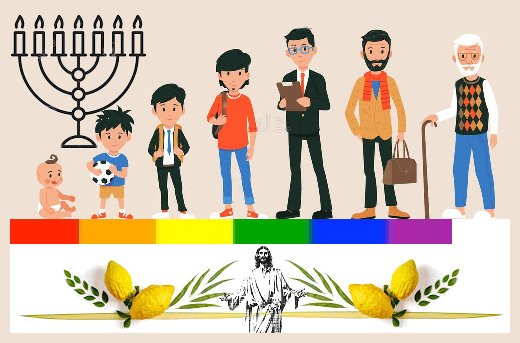
Continued from Part 1
Introduction
Chag Sukkot Sameach kol beit Yisra'el and Mishpachah! Welcome to the seventh and last day of the Feast of Tabernacles before the Last Great Day, Shemini Atseret, when tomorrow we shall gather together to mark the final High Sabbath of this season.
The Pattern of the Last Annual Festival
Ideally this is an eight day-long series of assemblies for both worship and (on the six non-sabbath days) for community-building and leisurely activities so ideally we would have had eight messages for you as in days past but I'm afraid I cannot physically manage that kind of work load any more. So, as we have been doing these past few years, there will be a second, and last, main message on Shemini Atseret and only a shorter one today as this is not a sabbath. Every beginning must have an ending and no less so than at Sukkot as today is the last day of the seventh festival so I have a brief message for you. Shemini Atseret is strictly-speaking, then, not a part of Sukkot but an 'eighth' festival of sorts, marking the beginning of a new world - the Millennial, resurrection world. Shemini Atseret is the re-launch of the world in Yahweh's image, the way it was always supposed to have been.
The Pilgrim Festivals and Marriage
How, then, are we to view the last day of the Festival of Booths? The three chief or Pilgrim Festivals of Pesach (Passover), Shavu'ot (Weeks, Eketost, 'Pentecost') and Sukkot (Tabernacles), may be described as reflecting the three stages of marriage, respectively:
- 1. Dedication, like our modern 'Engagement' (= Pesach) where the couple, as it were, spend the seven days of Chag haMatzah (Feast of Unleavened Bread) getting to know each other as brother and sister in Christ and develop a lasting friendship;
- 2. Betrothal, or spiritual marriage (= Shavu'ot) where the couple 'tie the knot' in a fixed and immutable commitment or covenant without physical intimacy during which time they make preparations for their wedding, the husband preparing a home for the couple to live in and the wife waiting expectantly while getting on with regular life in her father's or guardian's house; and
- 3. Full Marriage (= Sukkot), a seven-day long celebration that would correspond, in some respects, to a modern 'honeymoon'.
The Seven-Step Progress of the Messianic Community
This sequence likewise describes the step-wise spiritual progress of each individual congregation of qodeshim (saints, set-apart ones), as well as of the Messianic Community (Church) as a whole, as it grows and matures into the fullness, becoming an allegorical 'wife' to Messiah Yah'shua (Jesus). Each of the seven festivals teaches us, and reminds us, what spiritual progress consists of. The seven days of Chag haMatzah prep our minds to think along these lines and the seven days of Sukkot represent the fruitioning of this spiritual training and discipline, which is what the word 'discipleship' means.
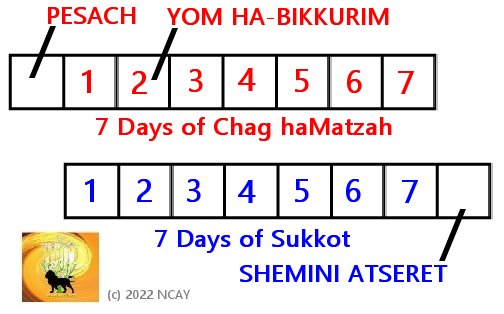
The Festivals as Key Life Markers
The seven festivals, like the seven days of Sukkot, are days of instruction and celebration - celebration of the sanctification that has resulted in communing with Yahweh and with one another in ahavah (love) and emet (truth). During them, and indeed throughout our whole lives, we learn the length and breadth of what salvation truly consists of...and it is infinitely more than responding to an altar call as a new believer. Life is both a life-long process as well a sequence of key life-changing events (like marriage, for instance) - both operate hand-in-hand. And as we all know, a marriage isn't 'made' on its first day - it's a life-long process of growth. This is what the festivals teach us and encourage us to work on year by year. They are key markers in life and make sure we stay on the 'strait-and-narrow'.
The Long Rescue from This Evil World
Sukkot marks the final end of many æons of time, what Paul describes as a long "rescue...from this present evil world" (Gal.1:4, Barclay) - not from physical existence (as a gnostic might view it) but from individual and societal sinning, making an end to hurting ourselves and one another. Our part - our contribution toward this restoration - consists of trusting in Yah'shua the Messiah (Jesus Christ), living the way He wants us to live by living His Father's mitzvot (commandments), and going out and telling everyone who will listen the Besorah, Gospel or Good News about Him - about what He has done, what He is now doing, and what He will yet do in bringing justice, divine order, ahavah (love) and shalom (peace) into the world again. We are to do that in our own neck of the woods - in our own immediate surroundings - first of all, beginning with our families and neighbours.
A Calling to Burundi
Some weeks ago I felt a very strong leading of the Ruach (Spirit) to send our alms or tithing-for-the-poor, which Yahweh commands we devote a third of His tithes to, the other two thirds being, respectively, for the ministry and for the festival gatherings like this one), to the starving people of Burundi, and especially for the orphans and other children there. Previously we have mostly focussed on India, Benin and Kenya. Three days ago I was speaking to Brother Gabriel, who heads our mission in the East African nation of Rwanda (which has a southern border with Burundi), who was reporting back to me on the visit he and his wife made to Burundi carrying the tithes we had sent.
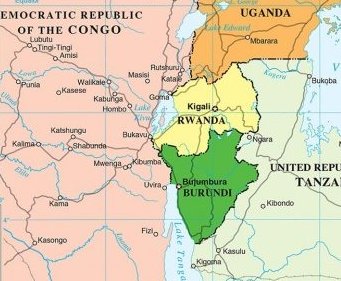
The Tragedy of Burundi
The experience shocked and moved him. Burundi is the poorest country in Africa and likely in the whole world. Famine has killed so many people. Hungry orphans wearing only filthy rags wander the streets begging. The active believers living there make huge personal sacrifices that make our sacrifices look pitiful by comparison. I will leave a link for you on the East Africa Mission website so that you can see photos and videos as we are going to be focussing our efforts there for the forseeable future. The need there is desperate. Let us bring food, shelter, clothing and the Good News of Yah'shua (Jesus) risen, teaching them of those days to come like the Sukkot days leading to the Millennium where want and suffering are cast aside by the grace of Elohim (God), and are no more. Please support the work we are now doing in Burundi in whatever way you can, even if it is only with your prayers. So a big thank you to those of you who have been faithfully paying your tithes because what you tithe desperately matters, saving lives both physically and spiritually. Brother Gabriel's first act upon arriving was to buy sacks of rice, beans and maize flour for those starving little ones.
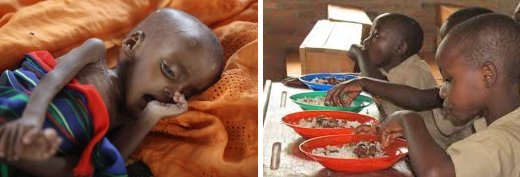
Yahweh's People Alert to the Poor
One of the apostolic conditions for being witnesses of the Besorah (Gospel, Good News) is that we "remember the poor" (Gal.2:10, Barclay), not to make them rich (and certainly never to make greedy ministers rich) but to make sure their basic needs are met so that they too can be productive citizens improving the lot of others. One thing you will notice especially in the Bible is how Yahweh's people were always alert to the poor. The attitude of the Hebrews was always very humane and the nevi'im (prophets) were especially on the ball when it came to this aspect of ministry. One thing you can be quite sure of in this world is that there is never a shortage of poor people needing assistance (1 Sam.2:7; Mt.26:11; Jn.12:8). To a very large degree, modern welfare states have addressed this issue admirably but in times such as ours, where welfare states are collapsing, the main burden of care will once again fall on individuals and small scattered Christians communities to help the less fortunate in whatever way we can.

No Favouritism Allowed
The Scriptures have a lot to say on this subject, for the welfare of the poor is dear to Yahweh's heart. This one Scripture by the apostle James, which you won't find the so-called 'Prosperity Gospel' ministers teaching very much, pretty much sums it up:
"My brothers, as believers in our glorious Master Yah'shua the Messiah (Lord Jesus Christ), don't show favoritism. Suppose a man comes into your meeting wearing a gold ring and fine clothes, and a poor man in shabby clothes also comes in. If you show special attention to the man wearing fine clothes and say, 'Here's a good seat for you,' but say to the poor man, 'You stand there' or 'Sit on the floor by my feet,' have you not discriminated among yourselves and become judges with evil thoughts?
"Listen, my dear brothers: Has not Elohim (God) chosen those who are poor in the eyes of the world to be rich in faith and to inherit the kingdom he promised those who love Him? But you have insulted the poor. Is it not the rich who are exploiting you? Are they not the ones who are dragging you into court? Are they not the ones who are slandering the noble name of Him to whom you belong?
"If you really keep the royal law ('fulfil the Torah of Elohim/God' - HRV; 'attain the goal of Kingdom Torah' - JNT/CJB) found in Scripture, 'Love your neighbour as yourself,' you are doing right. But if you show favoritism, you sin and are convicted ('repoved' - HRV) by the Torah (Law) as Torah (Law)-breakers" (James 2:1-10, NIV).
The Corrupting Influence of Wealth
Some of the greatest preachers, evangelists, nevi'im (prophets) and missionaries came from a background of poverty, both now and anciently. They tend to be a little more humble than the rich for as Yah'shua (Jesus) said, "How hard it is for the rich to enter the kingdom of Elohim (God)! Indeed, it is easier for a rope to go through the eye of a needle than for a rich man to enter the kingdom of Elohim (God)" (Luke 18:24-25, NIV/HRV). Which is not to say that being rich is a sin, for Yahweh has blessed and used many rich men and women in the Kingdom. The issue is the potentially corrupting influence of wealth and opulence. So poverty is not a social or spiritual stigma as compromised 'prosperity' preachers teach otherwise Yahweh would not command us to help those afflicted by it through no fault of their own.
It Just Takes a Third of Ten Percent...
Were the whole world to set aside a third of ten per cent of their wealth and income to help the poor, as Scripture teaches, and thus fulfil the Royal law of Torah mitzvot (commandments), there would be no justification for either the forced redistribution of wealth (which is socialism or theft) or and need for charities supported by a minority of kind-hearted and generous people or by believers able to help. We are not limited by our 3 per cent tithe either - that's what Yahweh commands so that even in times of prosperity and rising selfishness something is going to the poor. Nor would there be a need to keep on asking for ever larger love-offerings. If everyone were to do their little bit, the poor would be helped to rise out of poverty and become more self-sufficient.
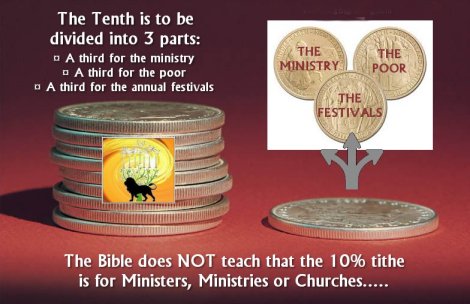
Yah'shua's Economic System and Safety Net for the Poor
When Yah'shua (Jesus) returns at the beginning of the autumn (fall) festivals, and sets up His theocratic kingdom, I am pretty sure something like the one third of ten per cent law will come into effect. At any rate, we know we won't be paying disproportionately high taxes as we do today. At last fairness and honesty will on the earth.
Power is the Reason for the Greed of the Super-Rich
We are entering a time in which the world population of the poor will increase exponentially as first world nations economically collapse and second- and third-world nations get even poorer. Our whole way of life is about to change, for as Proverbs says, "poverty will come on you like a bandit and scarcity like an armed man" (Prov.6:11, NIV), human needs will multiply, and generosity of heart will be called upon more than ever. You won't be able to rely on the benevolence of the super-rich in the new emerging feudalism because their absolute control and possession of wealth is the basis of their power, the thing they crave the most; and with that power comes the overturning of justice and the corruption of their souls. Praise Yahweh their reign will be short and their punishment severe if they do not repent!
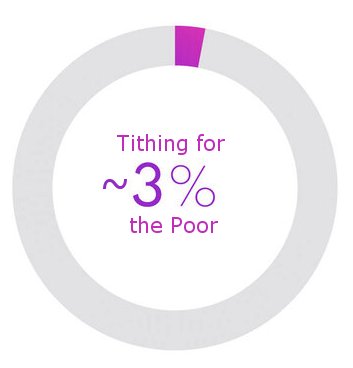 Setting aside ~3% for the poor won't break the bank
Setting aside ~3% for the poor won't break the bank
Neither Poverty or Riches, Please
What, then, should be our prayer at this time? I think the writer of Proverbs said it best:
"Remove falsehood and lies far from me;
Give me neither poverty nor riches --
Feed me with the food allotted to me;
Lest I be full and deny You,
And say, 'Who is Yahweh?'
Or lest I be poor and steal,
And profane the Name of my Elohim (God)"
(Prov.30:8-9, NKJV).
Conclusion
With that thought, let us end this last assembly of Sukkot (Tabernacles). We will assemble one final time tomorrow for Shemini Atseret to end the annual festivals and then we must tighten our belts again, buckle up for, and face, the difficult winter that lies ahead of us. I would encourage those who are able to assist the work in Burundi for the present. Yahweh bless you all! Amen.
Continued in Part 3

 V378
V378
|


